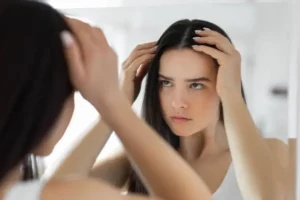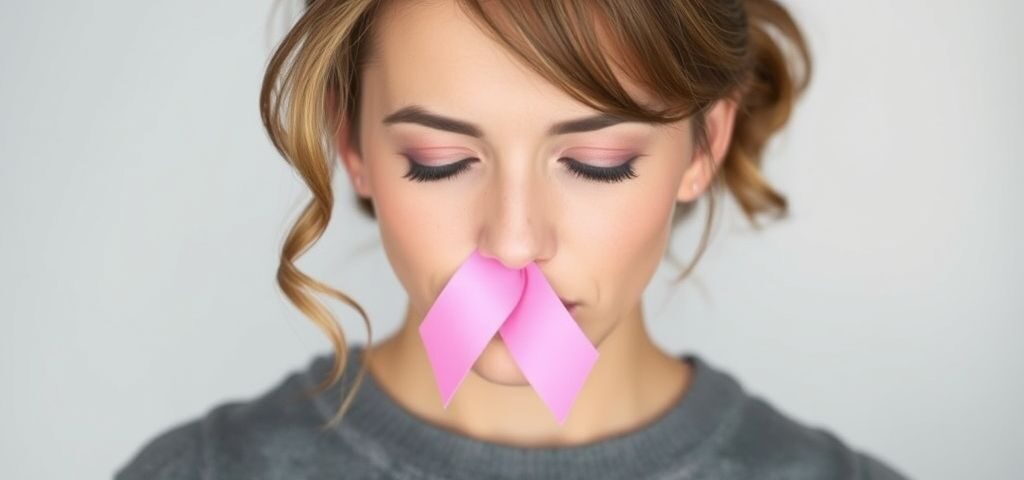You’ve just been diagnosed or know someone who has—and now you’re wondering, does breast cancer itself cause hair loss before any treatment begins? It’s a fair question. Hair loss is often one of the first fears people associate with cancer. But is it the disease or the treatment that causes it?
MY BLOG: { BREAST CANCER CAUSE HAIR LOSS}
Understanding Breast Cancer
What is Breast Cancer?
Breast cancer is a type of cancer that starts in the breast tissue. It can begin in the ducts (ductal carcinoma) or lobules (lobular carcinoma), and it may or may not spread to other parts of the body.
Common Signs and Symptoms
A lump in the breast or underarm
Changes in breast shape or size
Nipple discharge
Skin dimpling or thickening
How It’s Diagnosed
Diagnosis usually involves:
Mammograms
Ultrasounds
Biopsies
Blood tests
Hair Loss and Its Triggers
How Hair Grows
Hair goes through a cycle: growing (anagen), resting (telogen), and shedding (catagen). Any disruption in this cycle can cause temporary or permanent hair loss.
Common Causes of Hair Loss
Hormonal changes
Stress
Nutritional deficiencies
Medical conditions (like thyroid disease)
The Psychological Impact
Hair loss isn’t just cosmetic—it affects confidence, identity, and mental health, especially for those already dealing with a cancer diagnosis.
Does Breast Cancer Cause Hair Loss Before Treatment?
Breaking Down the Myth
No, breast cancer itself rarely causes hair loss before any treatment begins. The most common culprit is treatment, especially chemotherapy.
Scientific Explanation
Breast cancer doesn’t attack hair follicles directly. However, there are some indirect ways hair may start to thin even before any chemo, radiation, or hormone therapy is introduced.
Hormonal Imbalance and Hair Thinning
Estrogen and Progesterone’s Role
These hormones help keep hair in the growth phase longer. Breast tumors that affect estrogen production—especially estrogen receptor-positive cancers—can disrupt this balance.
How Tumors Affect Hormones
Tumors can sometimes produce hormone-like substances or affect how hormones are processed, which could theoretically result in mild hair thinning, though it’s not common.
Menopause and Cancer
If breast cancer triggers early menopause, hair thinning may be noticeable, just like in natural menopause.

Stress-Induced Hair Loss
Cancer Diagnosis Is Stressful
Hearing “you have cancer” is a life-altering moment. Emotional trauma and anxiety can trigger telogen effluvium, a type of temporary hair loss caused by stress.
What Is Telogen Effluvium?
It forces hair into the shedding phase prematurely. The catch? Hair may not fall out for 2–3 months after the stressful event.
Nutritional Deficiencies Before Treatment
Poor Appetite and Diet
Some people lose their appetite due to stress, early symptoms, or underlying inflammation. This leads to low levels of essential nutrients.
Critical Nutrients for Hair Health
Iron: Low levels can cause diffuse hair shedding.
Zinc: Essential for tissue repair and hair growth.
Protein: The building block of hair itself.
Vitamins D & B12: Crucial for follicle function.
Hair Loss Caused by Breast Cancer Treatments
Chemotherapy
Chemo targets all fast-dividing cells, including hair follicles. Most people on chemo experience dramatic hair loss 2-4 weeks into treatment.
Radiation Therapy
Only causes hair loss in the area being treated. So, unless your head is exposed, radiation likely won’t affect scalp hair.
Hormonal Therapy
Treatments like Tamoxifen may cause gradual thinning over time due to altered hormone levels.
Targeted Therapy
Drugs like Herceptin or Kadcyla may or may not cause hair loss—side effects vary by individual and drug type.
Differences Between Cancer-Related and Treatment-Related Hair Loss
| Factor | Cancer Itself | Treatment |
| Timeline | Rare, gradual | 2–4 weeks after treatment starts |
| Pattern | Diffuse thinning | Sudden, dramatic |
| Reversibility | Yes | Often, after treatment ends |
Coping with Hair Loss
Scalp Care Tips
Use gentle, sulfate-free shampoos
Avoid heat styling or tight hairstyles
Massage your scalp to stimulate blood flow
Style Options
Wigs, scarves, caps, turbans—you’ve got choices!
Some insurance plans even cover wigs with a prescription
Emotional Support
Join a support group
Speak with a therapist
Confide in trusted friends or family
How to Tell If Hair Loss is Related to Breast Cancer
Get professional advice. A dermatologist can analyze your scalp, while your oncologist may order blood tests to rule out vitamin or hormonal issues.
Preventive Tips Before Treatment Begins
Cold Caps
Scalp cooling caps constrict blood vessels during chemo, reducing drug delivery to follicles. They’re effective in preventing hair loss for many.
Strengthen Hair Naturally
Eat a protein-rich diet
Stay hydrated
Handle hair gently—no coloring or harsh treatments
Patient Stories
Some patients report thinning hair before starting treatment, often linked to stress, poor appetite, or hormonal fluctuations, not the cancer itself.
What Doctors Say
Dr. Emily Wong, an oncologist, says:
“True hair loss from breast cancer is incredibly rare before treatment. Most hair shedding we see is related to stress or nutrition.”
Dr. Lisa Carroll, dermatologist, adds:
“We often find telogen effluvium in newly diagnosed patients due to the emotional toll rather than the disease.”
When to Worry About Hair Loss
Suddenly, large clumps of hair
Bald patches
Accompanied by fatigue, cold sensitivity, or skin issues
If concerned, speak to your healthcare provider—don’t self-diagnose.

Conclusion
So, does breast cancer cause hair loss before treatment? Not usually. Most hair loss happens because of the treatments, not the cancer itself. But factors like stress, hormone shifts, and nutritional deficiencies can indirectly cause thinning before therapy begins.
Understanding the real cause can help you prepare, stay calm, and take steps to protect your hair and well-being.
FAQs
Can breast cancer itself trigger alopecia?
Not directly. Most hair loss happens due to treatments or stress-related issues, not the cancer cells themselves.
How soon after chemo does hair fall out?
Typically, within 2–4 weeks after the first chemotherapy session.
Will my hair grow back after breast cancer treatment?
Yes! Hair usually begins to regrow 1–3 months after treatment ends, though texture and color may change temporarily.
Can you prevent hair loss before cancer therapy?
You can reduce the risk using scalp cooling caps, good nutrition, and gentle hair care, but full prevention isn’t always possible.
What can I eat to strengthen my hair during cancer?
Lean protein, leafy greens, nuts, eggs, berries, and plenty of water can help keep your hair as strong as possible.

